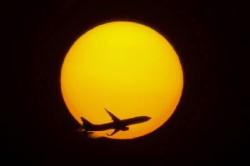In a bid to bring down the cost of air operations in the country, Civil Aviation and Petroleum ministries would make a joint representation to the Finance Ministry to notify jet fuel as a 'declared good', enabling levying of a flat 4 per cent tax on it. At present, sales tax on aviation turbine fuel (ATF) ranges from four to 35 per cent, varying from state to state. The cost of jet fuel accounts for about 40 per cent of the operating cost of the Indian carriers, most of which are facing financial trouble.
At present, sales tax on aviation turbine fuel (ATF) ranges from four to 35 per cent, varying from state to state. The cost of jet fuel accounts for about 40 per cent of the operating cost of the Indian carriers, most of which are facing financial trouble.
The decision to jointly approach the Finance Ministry on the issue was taken at a meeting between Civil Aviation Minister Ajit Singh and Petroleum Minister M Veerappa Moily on Tuesday.
Talking to reporters after the meeting, Singh said Moily agreed to the proposal.
Moily said his ministry was in agreement on giving declared goods status but the issue has to be decided by the Finance Ministry. "We will jointly make a representation to the Finance Minister," the oil minister said.
At the meeting, Singh is believed to have said that ATF prices in India were several times higher than countries in the neighbourhood, including those in Southeast and the Gulf.
It was also said to have been pointed out that foreign airlines operating to India picked up jet fuel at concessional rates due to international agreements, which was far below what was paid by the Indian airlines for the same amount of fuel from the same airport.
The two ministers also agreed to a proposal to put ATF under the Petroleum and Natural Gas Regulatory Board (PNGRB) to check any cartelisation among the
Charging the oil firms with indulging in cartelisation in ATF pricing as they were charging the same price at different airports, Singh said placing jet fuel under PNGRB would mean that the Board could monitor prices and take corrective measures if it felt that cartelisation was taking place.
In this context, the ministry pointed out that on October 16, the three state-owned oil companies charged the same rate of Rs 52,792 per kilolitre of ATF in Chennai and in Kolkata Rs 54,479.
The aviation minister also suggested moving to the Mean of Platts Arab Gulf (MoPAG) pricing mechanism for jet fuel instead of import parity pricing that the oil firms follow at present.
Singh said adoption of MoPAG would bridge the huge price differential in ATF pricing that airlines face while picking up aviation gas in India and nearby airports like Singapore, Bangkok and Dubai.
Replying to questions on the Kingfisher Airlines, Singh acknowledged that its closure would have "a lot of collateral damage".
"DGCA has made it very clear that in order to allow them to fly again, they have to satisfy with their operational and financial plan," he said, adding that the regulator's concern was about safety of operations, adherence to the flight schedules and paying dues to its employees, oil companies, airport operators and other lenders and service providers.
Maintaining that the government did not regulate airfares, he said the ministry only wanted to make the system transparent.
"What we are trying to do is to make the system for deciding the fares transparent. Public should know what is the bucket system and the range they have given should be reasonable," he said.









 © 2025
© 2025